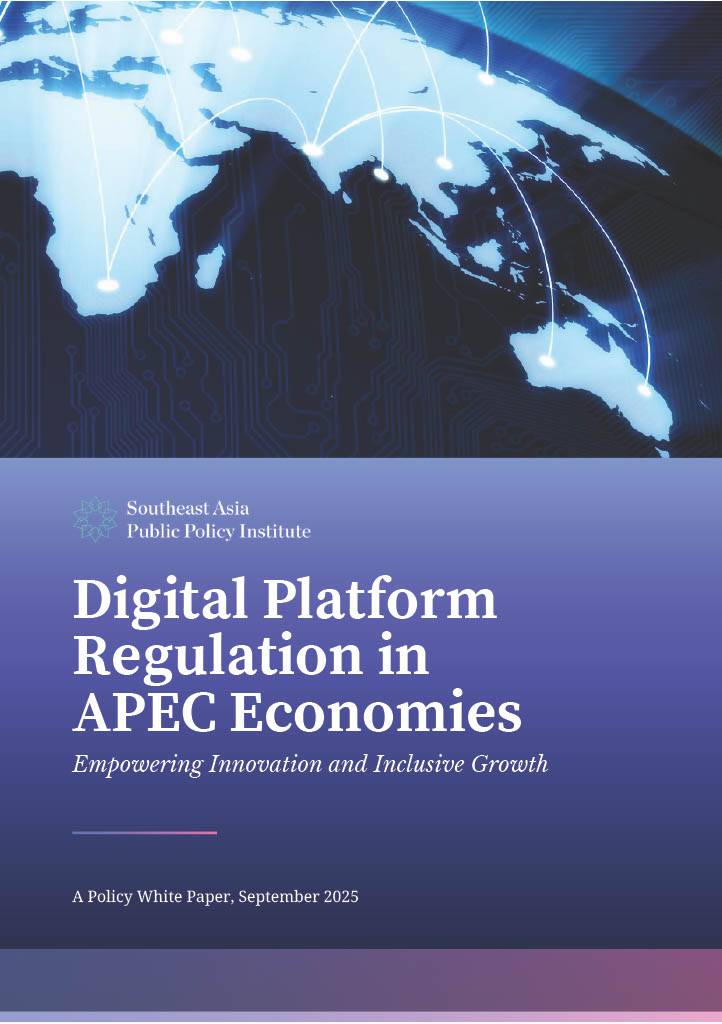Toward Balanced Digital Platform Regulation in APEC

Digital platforms have become the backbone of the Asia–Pacific economy. Southeast Asia’s internet economy alone exceeded USD 200 billion in 2023 and is projected to surpass USD 300 billion in 2025, driven by e-commerce, fintech, mobility, food delivery, and digital content. Platforms now function as essential infrastructure for trade, payments, logistics, and communication, opening extraordinary opportunities for micro, small, and medium-sized enterprises (MSMEs). Yet their systemic role has also raised concerns around competition, consumer protection, and market fairness—prompting debate over whether APEC should adopt more structured regulation.
About the Report
This policy white paper examines whether the European Union’s Digital Markets Act (DMA)—the world’s most ambitious ex ante regulation of digital “gatekeepers”—offers a suitable model for APEC economies. The analysis compares global approaches (EU, UK, US, China), reviews regulatory developments in both Emerging Regulatory Economies (Indonesia, Malaysia, Thailand, Philippines, Vietnam) and Advanced Regulatory Economies (Singapore, Japan, South Korea, Australia), and quantifies potential compliance costs if DMA-style obligations were applied across nine APEC economies.
Key Findings
- The DMA is influential but not a ready blueprint. Its obligations on non-discrimination, interoperability, data access, and defaults highlight real pressure points, but they also generate compliance complexity, safety trade-offs, and new burdens for smaller firms.
- APEC economies are already adapting incrementally. Emerging economies are layering accountability into competition, consumer, and privacy laws, while advanced economies are piloting targeted rules on app stores, billing, online safety, and data portability.
- Quantitative analysis underscores distributional stakes. In a medium scenario, DMA-style rules would impose about USD 3.07 billion in annual compliance costs across nine APEC economies—only 0.02% of combined GDP, but with 70% of the burden (USD 2.15 billion) falling on MSMEs. In emerging markets, where platforms are the main route to market, these costs could slow onboarding, tighten margins, and discourage growth.
- Smart regulation requires proportionate, regionally compatible approaches. Evidence-based, inclusive policymaking—using flexible tools such as sandboxes, phased rollouts, and soft-law coordination—can safeguard fairness and trust without undermining innovation.
Recommendations for APEC Policymakers
- Ground rules in evidence and proportionality, avoiding blunt size-based thresholds.
- Engage inclusively with MSMEs, developers, platforms, and consumers in regulatory design.
- Pilot measures before mandating them economy-wide, with phased rollouts and safe harbours.
- Ensure coherence across competition, privacy, consumer protection, and online safety.
- Support MSME participation through ombudsman services, dispute portals, and compliance templates.
- Promote regional compatibility through shared definitions, standards, and mutual recognition.
- Embed monitoring and review to recalibrate rules as technologies and markets evolve.
Download the full report here.
About the Southeast Asia Public Policy Institute
The Southeast Asia Public Policy Institute is a research institute based in Bangkok and Singapore, working across the region. Our mission is to support the development of solutions to the most pressing public policy challenges facing Southeast Asia in the 21st century. The Institute undertakes in-depth research to develop actionable policy solutions on a range of issues across sustainability, technology, public health, trade, and governance. We convene dialogues with stakeholders and decisionmakers to drive discussion on the challenges and opportunities facing markets across the region. The Institute draws on a network of in-market researchers, advisors, and partners to provide insights and recommendations for governments, policymakers, and businesses.



